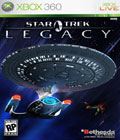Genre: Action
Publisher: Bethesda
Developer: Mad Doc
Release Date: September 26, 2006
Star Trek: Legacy was one of the first games that we checked out at Bethesda's booth, and it immediately became apparent that the title is definitely not one to be balked at. Previous games set in the Star Trek canon have had varying degrees of quality attached to them, no matter how old or new the particular facet of the timeline was. Star Trek: Legacy not only ups the ante by promising gameplay that spans all five television series of the popular show, on its 40th anniversary to boot, but is on course to do so in a very satisfying fashion. At last, we'll see a Trek title that is both accessible to casual fans while remaining faithful to the source material.
As stated, Star Trek: Legacy spans all five of the television shows, starting with the original Star Trek then working its way through Deep Space 9, The Next Generation, Voyager, and Enterprise. With a straight face, it was proudly proclaimed that players will be able to captain every official Enterprise vessel that sailed. Ever. In total, players will be able to captain over 60 ships spanning the five shows, modeled by some of the same talent that created the ships for the various series.
Starting off in the campaign mode, you play in the timeline that took place in the Enterprise series, captaining the iconic ship through both hallmark battles from the series and through totally new situations created by the development team. As you progress through the timeline, you'll face new enemies and situations, such as the epic battles between Kirk and Khan, or the struggles Picard underwent against the Borg. You can build up your own fleet to consist of whatever ships you've accumulated across the timelines. It's good practice to gain new ships that address any shortcomings in your offensive or defensive capabilities. Each ship itself can be upgraded in various ways and however the player sees fit, which really builds upon the almost emotional attachment between the player and his fleet.
There really hasn't been a previous title in the franchise that has showed off the beauty and power that the starship combat in the Star Trek series can offer. Shields glow brightly when struck by the glowing lances of phaser fire, but when shields fail, holes begin to form in the hull and expose glowing ship components, which leave a trail of smoke and debris. The lighting effects in the game are phenomenal, as evidenced by the light bloom and glare a sun makes as it suddenly comes into view around a planet. The ship models themselves are very well modeled and are easily the best looking Star Trek starships in a video game to date. The HUD that displays your ship information, targeting, and other data is both useful and minimalist, letting the graphics of the game itself fill up most of the on-screen action.
There are many aspects of Star Trek: Legacy that gear the title into a tactical direction. A cunning captain with low shields may lure his opponent into a nebula to drop his shields and level the playing field. That same captain may then realize that it's no use powering non-existent shields and divert that power to the engines or weapons systems, using a very easy-to-utilize power distribution menu. Using the tactical map to send your fleet into battle to defend a space station against an attacking fleet of Romulan vessels, you may suddenly find that a Borg cube has arrived in the system. As both Federation and Romulan ships cease hostilities against each other, how do you choose to deploy your fleet against the new threat?
Star Trek: Legacy promises to have an interesting Xbox Live multiplayer mode, composed of both standard battles between players as you would presume, and of historic battles, such as the aforementioned Kirk-Khan conflicts. Missions can be played cooperatively among players, in which an actual human player captains each ship in the fleet.
All in all, Star Trek: Legacy is impressive on a variety of levels. On the one hand, it is truly a Trek fans' game, given the impressive scope and the sheer authenticity that Bethesda is bringing to the table. On the other, the title is easy to pick up and play by gamers who don't know their phasers from their disruptor beams. The multiplayer and cooperative modes promise a brand new dynamic for games set in the Star Trek universe, but the big draw is undoubtedly the single-player content. The ability to captain over 60 authentic Star Trek ships spanning 40 years of canon and all five television shows and captains? Sign us up. Look for more information on Star Trek: Legacy as it get closer to its release date this autumn.
Amanda "StormyDawn" Hale also contributed to this preview.
More articles about Star Trek: Legacy













 Star Trek: Legacy places you in the role of the Admiral of a task force of warships, which you control in small and large-scale battles. Test your strategic and tactical skills in real-time combat featuring authentic spaceships, full damage modeling, and spectacular visual effects. The storyline in Legacy spans the entire Star Trek Universe, including the Original Series, Next Generation, Deep Space Nine, Voyager, and Enterprise eras.
Star Trek: Legacy places you in the role of the Admiral of a task force of warships, which you control in small and large-scale battles. Test your strategic and tactical skills in real-time combat featuring authentic spaceships, full damage modeling, and spectacular visual effects. The storyline in Legacy spans the entire Star Trek Universe, including the Original Series, Next Generation, Deep Space Nine, Voyager, and Enterprise eras.


















